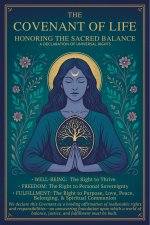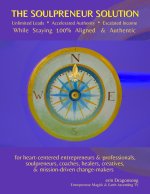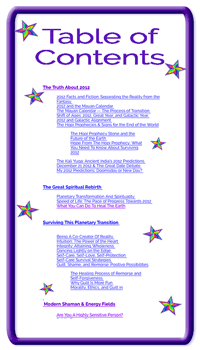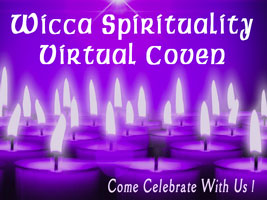Summer Solstice: A Shift of Power
Silver Chalice E-Zine Sabbats & Esbats

|
|
|
|
|

|
The Tradition of Midsummer
The celebration for Midsummer traditionally took place on June 24th, because it was the longest day of the year. This is no longer so, however, due to the quirks of manmade calendars. The power is on the actual day when the Wheel of the Year turns, though, so nowadays Midsummer Day rituals occur around June 21, on the Summer Solstice. The exact date of the Summer Solstice will vary from year to year, so check your ephemeris. Naturally, this is the date for the Northern Hemisphere. For the Southern Hemisphere, the date of the Summer Solstice would be around December 21. The name "Litha" derives from the Old English phrase for June, meaning "before Midsummer." At least, this is according to one monk's writings: Bede's De Temporum Ratione ("On The Reckoning Of Time"). This is apparently a recent name for the Sabbat; there seems to be no record of its use in ancient times. Not the most meaningful of names, perhaps. But then, neither is "Midsummer." According to the Julian calendar, June 24 is officially designated the beginning of summer, but for those of us in mild climates, it seems almost like the middle. As a solar festival, bonfires would be lit at Midsummer Eve. People would jump the fire, and later spread the ashes on the fields as a blessing, as well as fertilization. In Celtic celebrations, wheels (symbolizing the Sun) were lit and rolled down hills ... a practice which is not recommended for dry climates! This is a good time to give offerings to your allies and to faeries or energy beings who may help you, or who share your environment. This promotes goodwill, and increases the harmony of your home. As an offering, food is usually appreciated.
Summer Solstice: The Mortality Moment
Midsummer is a time of change. The Oak King has triumphed, yet must begin to give way to the Holly King. (And while the Boys are playing, the Goddess has risen to the height of Her life-giving powers.) This is the moment of mortality: Though the life force is still powerful and in most ways still gaining in strength, we can see the end zone -- the limits of growth and the inevitability of decline. This is exactly what our society is going through. A cultural mid-life crisis, trying to deny or at least postpone its transformation. It still seems strong and vigorous and as powerful as ever. But when it must wield violence so frantically, it shows that its actual Power is low. Thus, in trying to postpone the inevitable, it is actually hastening it. And within each of us is the same struggle. Litha can bring the often-subconscious awareness of mortality into stark focus.
Which Side of the Coin?
Every year, when Summer Solstice rolls around, I wonder whether I should be celebrating the official beginning of summer, or mourning the Sun's beginning decline. And ever year, the answer I come to is... Both. The inspiring thing about the Summer Solstice is that despite how it seems on the surface, both celebrations are of beginnings. Even the foreshadowed decline of the Sun and return of the long dark nights is a beginning. And this balance is necessary. Imagine if the Sun's heat continued to grow without decline! The balance is maintained even by death, and this is a subtle gift. Litha offers the opportunity to re-evaluate our perception of death. We tend to think of death as an ending -- which it is, undeniably. Yet it is also the beginning of something much greater. Do we mourn the end of our dreams, when we wake to a beautiful, happy day? Death is only this. So Summer Solstice offers us the opportunity to practice taking command of our thoughts. This practice is one of the keys to the Spiritual Transition. We don't deny the dying Sun, but we remember that that too is a harbinger of future rebirth. We don't deny the coming dark, but we fully appreciate all the light here now. This is not denial. It doesn't mean turning a blind eye to what we might not want to see. We're not pretending things are different than they are, but we look at them from a deeper perspective, a perspective that reflects a different truth than the cultural standard.
A Celebration of Paradox
More than any other festival on the Wheel of the Year, Summer Solstice is a celebration of paradox . . . the fullness of life in the face of looming mortality. This makes it especially powerful. In my mind, paradox is God's front doorstep. Whenever we have two entirely contradictory and both true facts, we are peering through the keyhole to the Divine's inner sanctum... perhaps peering directly into the eye of God Herself, as She watches us, waiting giddily for us to find Her, in this game of cosmic hide-and-seek. Summer Solstice makes explicit the bitterness that flavours every sweetness. We may not always see it -- we don't like to look for it. But dwelling within every joy is the impending sorrow of its loss. (Every joy, that is, except Bliss -- the Divine joy that is eternal and untainted by grief.) The full joy of Summer Solstice, heralding the best part of the year, is likewise spiced with the sorrow of year that is, in fact, winding down. Summer Solstice is then our opportunity to face this paradox, and choose nonetheless to celebrate.
With Brightest Blessings,
erin Dragonsong

Return from
Sabbats & Esbats & Other Wicca Rituals
to
Silver Chalice E-Zine










